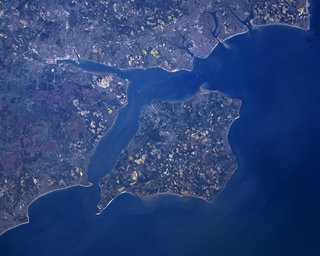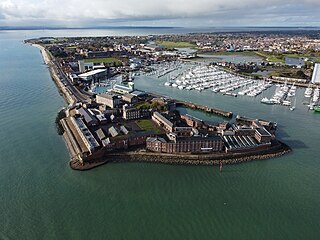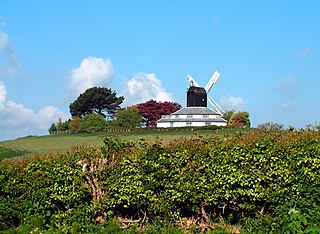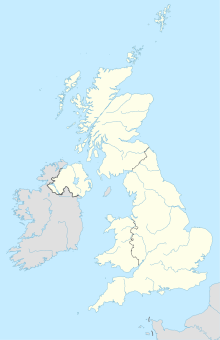
The Solent is a strait between the Isle of Wight and mainland Great Britain. It is about 20 miles long and varies in width between 2+1⁄2 and 5 mi, although the Hurst Spit which projects 1+1⁄2 mi (2.4 km) into the Solent narrows the sea crossing between Hurst Castle and Colwell Bay to just over 1 mi (1.6 km).

The River Axe is a 22-mile (35 km) long river in the counties of Dorset, Somerset and Devon, in the south-west of England. It rises in Dorset and flows south to Lyme Bay which it enters through the Axe Estuary in Devon. It is a shallow, non-navigable river, although its mouth at Seaton has some boating activity. The name Axe derives from a Common Brittonic word meaning "abounding in fish", and is cognate with pysg, the Welsh word for fish.

Gosport is a town and non-metropolitan borough, on the south coast of Hampshire, South East England. At the 2021 Census, its population was 81,952. Gosport is situated on a peninsula on the western side of Portsmouth Harbour, opposite the city of Portsmouth, to which it is linked by the Gosport Ferry. Gosport lies south-east of Fareham, to which it is linked by a Bus Rapid Transit route and the A32. Until the last quarter of the 20th century, Gosport was a major naval town associated with the defence and supply infrastructure of His Majesty's Naval Base (HMNB) Portsmouth. As such over the years extensive fortifications were created.

Fort Blockhouse is a former military establishment in Gosport, Hampshire, England, and the final version of a complicated site. At its greatest extent in the 19th century, the structure was part of a set of fortifications which encircled much of Gosport. It is surrounded on three sides by water and provides the best view of the entrance to Portsmouth Harbour. It is unique in that it was built over five centuries from its original construction as a blockhouse in 1431 to the final addition of submarine base structures in the mid-1960s. Coastal fortification was abolished nationally in 1956, and the fort has not been used in a military capacity since 2021.

Fort Gilkicker is a historic Palmerston fort built at the eastern end of Stokes Bay, Gosport, Hampshire England to dominate the key anchorage of Spithead. It was erected between 1863 and 1871 as a semi-circular arc with 22 casemates, to be armed with five twelve-inch guns, seventeen ten-inch guns and five nine-inch guns. The actual installed armament rather differed from this. In 1902 the RML guns were replaced by two 9.2-inch and two six-inch BL guns, and before the First World War the walls were further strengthened with substantial earthwork embankments. The fort was disarmed in 1956 and used for storage until 1999, and is currently in a state of disrepair.

Stokes BaySZ 590 980) is an area of the Solent that lies just south of Gosport, between Portsmouth and Lee-on-the-Solent, Hampshire. There is a shingle beach with views of Ryde and East Cowes on the Isle of Wight to the south and Fawley to the south west. The settlement of Alverstoke is close by.

The Severn Estuary is the estuary of the River Severn, flowing into the Bristol Channel between South West England and South Wales. Its very high tidal range, approximately 50 feet (15 m), creates valuable intertidal habitats and has led to the area being at the centre of discussions in the UK regarding renewable tidal energy.

Icklesham is a village and civil parish in the Rother district of East Sussex, England. The village is located about six miles (10 km) east of Hastings, on the main A259 Hastings to Rye road. The surrounding countryside is a made up of fields, hills, woods, orchards and vineyards.

Hodbarrow RSPB Reserve is a nature reserve run by the Royal Society for the Protection of Birds (RSPB) on the edge of the Lake District National Park in Cumbria, England. It is on the Duddon Estuary near the town of Millom and covers an area of 3.28 hectares.

Alverstoke is a village in the borough of Gosport, on the south coast of Hampshire, England. It stretches east–west from Fort Blockhouse, Haslar to Browndown Battery, and is centred 0.5 miles (0.80 km) east of the shore of Stokes Bay and near the head of a creek which extends a mile westward from Portsmouth Harbour.

Tetney is a village in the East Lindsey district of Lincolnshire, England, just west of the Prime Meridian.

Rye Meads is a 58.5-hectare (145-acre) biological Site of Special Scientific Interest (SSSI) in Rye House, Hoddesdon, Hertfordshire. It is one of series of wetlands and reservoirs situated along the River Lea, to the north-east of London. It is part of the Lea Valley Ramsar site and a Special Protection Area.

Fort Monckton is a historic military fort on the south-east shoreline of the Gosport peninsula, Hampshire. Built on the ruins of Haselworth Castle to protect Portsmouth Harbour at the start of the American War of Independence, it was rebuilt in the 1880s as a Palmerston fort.

The North Norfolk Coast Site of Special Scientific Interest (SSSI) is an area of European importance for wildlife in Norfolk, England. It comprises 7,700 ha (19,027 acres) of the county's north coast from just west of Holme-next-the-Sea to Kelling, and is additionally protected through Natura 2000, Special Protection Area (SPA) listings; it is also part of the Norfolk Coast Area of Outstanding Natural Beauty (AONB). The North Norfolk Coast is also designated as a wetland of international importance on the Ramsar list and most of it is a Biosphere Reserve.

Pachytychius haematocephalus, the gilkicker weevil, is a species of true weevil in the family of beetles known as Curculionidae. It is found in North America, and in the area from whence its name derives, Fort Gilkicker, in Gosport, Hampshire, UK.

Hurst Castle and Lymington River Estuary is a 1,077.3-hectare (2,662-acre) biological and geological Site of Special Scientific Interest near Lymington in Hampshire. It is a Nature Conservation Review site and two areas are Geological Conservation Review sites. Three areas are local nature reserves, Boldre Foreshore, Sturt Pond and Lymington and Keyhaven Marshes; the latter site is managed by the Hampshire and Isle of Wight Wildlife Trust. Part of it is North Solent National Nature Reserve. It is part of Solent and Southampton Water Ramsar site and Special Protection Area. Parts of it are in Solent Maritime and Solent and Isle of Wight Lagoons Special Areas of Conservation.
















